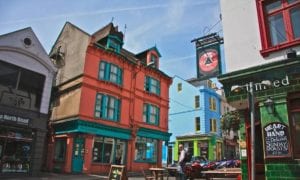Pubs in the UK V.S pubs in China
The importance of pubs for British people is equivalent to café for Americans or tea house for Chinese people. Pub is one of the most important and typical elements of British culture.
For British people, pub is a not only a place for friends to gather together to enjoy their leisure time but also they can bring their family members, even little kids. Atmosphere in the pubs are always friendly in the afternoon. Most pubs in the UK allow children to come in accompanied by an adult. However, children are not allow in after 6:30pm. In China, pubs are welcomed by young people. They often go there to meet friends and have drinks together. Family members often go to other places to have fun, such as café, restaurant, tea house or farmland.








